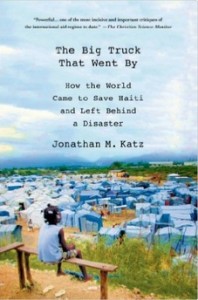This book is a first-rate account of Haiti’s recent history, including the January 2010 earthquake, from the only American reporter stationed in the country at the time. Jonathan M. Katz was with the Associated Press and his observations of the earthquake and the even more tragic response to it resonated with me on so many levels. He describes how the response of international donors to the earthquake created problems that did not previously exist and despite their stated intentions, largely failed to accomplish what they had set out to do.
You might be tempted to think that this type of inept response could only occur in a developing country, but then consider the lessons of some of our recent disasters. I can imagine any one of my friends in the New Orleans area nodding in agreement upon reading the sections of the book dealing with the attempts to provide food and temporary shelters to those in Haiti who had lost everything. In my experience, non-profit organizations focused on disaster relief often focus more on serving the interests of their donors than the intended beneficiaries; that is part of the reason why I set up Prisere as an LLC and not a 501-c-3 charity. (There were other considerations, too.)
The real tragedy is that many of the losses were entirely avoidable. The earthquake that struck Haiti on January 12, 2010 registered 7.0 on the Richter Scale; severe to be sure, but only six weeks later, on February 27, an earthquake of magnitude 8.8 struck Chile, causing fewer casualties, largely due to building codes ensuring safer structures. The title of the book refers to the shaking that occurs when large trucks drive by; many Haitians initially attributed the movements on January 12 to that of a passing truck until they realized it was a true earthquake. The centralization of people and services in Port-au-Prince, Haiti’s capital, that proved so deadly, was partly the result of U.S. foreign policy and actions. The author argues that as Americans, we have a responsibility to understand, and correct, the harm caused by the massive humanitarian efforts our government led. I agree.
I was surprised that the author took such an unflinching look at the apparent cynicism behind the actions of Hillary Clinton. One of her first acts as Secretary of State was to order a review of U.S. policy towards Haiti. When, hours later, the earthquake struck, both Clintons assumed very visible roles in prodding other governments and non-governmental organizations to step up. Haitians are left to live with the consequences of our response; we have moved on. The ongoing struggles in Haiti are no longer part of our news cycle.
Another surprise, at least for me, was the author’s account of the actions of the actor Sean Penn, which he personally observed. My experience at Ground Zero has led me to be somewhat cynical about celebrities appearing on the scene of the disaster to “help”. I remember only too well how, in the aftermath of 9-11, a number of celebrities callously treated the area as another velvet rope. So-called “B” and “C” list celebrities could be photographed touring the remains with a uniformed officer as their guide. An “A” list celebrity would be taken about by then Mayor Giuliani. Only when the families of the deceased protested how disrespectful this practice was (remember at that time, most of them were still anxiously awaiting recovery of the remains of their loved ones), did the guided celebrity tours stop. At that time, the families of the 9-11 victims were quite powerful as their losses gave them political clout. According to what Katz had observed, and I trust the observations of a skeptical journalist, Penn was remarkably effective at showing up with media coverage and embarrassing local officials into doing something useful.
With natural hazards increasing in both frequency and severity, we all benefit from understanding how disaster relief works and how it could be improved. We benefit even more from understanding what can be done to reduce disaster risk. This book delivers on providing critical insights into both policy issues.
